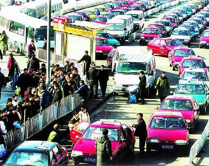 As the weeklong Spring Festival holidays drew to a close on Friday, millions of people across the country were once again on the move. With Friday's transportation peak, trains, planes, buses and cars were once again groaning under the strain.
As the weeklong Spring Festival holidays drew to a close on Friday, millions of people across the country were once again on the move. With Friday's transportation peak, trains, planes, buses and cars were once again groaning under the strain.
Four million people traveled by train on Friday and 360,000 took to the air, according to official estimates by the Ministry of Railways and the General Administration of Civil Aviation of China, making a new high in the nation's travel history.
"The seats in my compartment are all occupied," said Zhang Nan, who went by train on Friday from her hometown Xi'an, capital of Northwest China's Shaanxi Province, to Beijing, where she works.
In a telephone interview Zhang said she had planned to travel by train on Thursday, but could not get a ticket.
The square in front of Xi'an Railway Station was packed with people vainly trying to buy tickets, she added.
Zhang said many passengers on her train were farmers-turned city workers -- natives of rural areas of Shaanxi, but now employed in Beijing.
In China, increasing numbers of rural workers are migrating to big cities, including Beijing, Shanghai and Guangzhou, in search of jobs, particularly in the burgeoning construction industry.
Most of them returned to their homes for the traditional Spring Festival holidays, which began on February 1.
In order to handle the mass movement many railway stations brought in temporary trains to meet demand.
For example, Chongqing on Friday added 25 temporary trains for the Beijing, Shanghai and Guangzhou routes, the main destinations of farmers-turned city workers.
A report by China Central Television reminded people who had not yet got their tickets to watch for updated information on notice boards at railway stations which gave up-to-the-minute details of additional services.
Safety is another top priority at both railway stations and airports.
In Xi'an, said Zhang, only people with tickets were allowed into the railway station and security staff carefully checked those entering.
The General Administration of Civil Aviation of China issued a circular on Wednesday tightening controls on drinks carried by passengers. Each passenger was limited to two bottles of soft drinks such as mineral water, milk or juice when boarding aircraft, with each bottle no more than 500 milliliters.
All bottled drinks had to be opened for scrutiny, the circular said. And from February 2, passengers at Capital International Airport in Beijing are required to take a sip from any bottled drinks they are carrying at the security check-in, according to Xinhua News Agency.
Tragically the festive season has been blighted by fatal accidents. Eight people were killed and 34 injured when an overloaded bus went out of control and crashed in Dazhou, Southwest China's Sichuan Province, at 7:40 am on Thursday.
According to Dazhou public security bureau, the bus, designed to carry 26 passengers, had 42 people on board at the time of the accident. Most of the passengers were rural workers heading out in search of jobs elsewhere.
The day before, at 1:15 pm, a bus careered 7.8 meters off a bridge in Northwest China's Ningxia Hui Autonomous Region.
The accident claimed 17 lives and injured 40 others.
(China Daily February 8, 2003)
|

